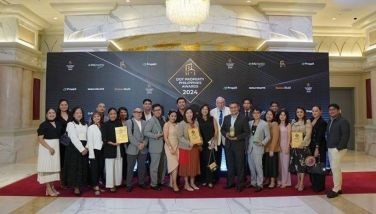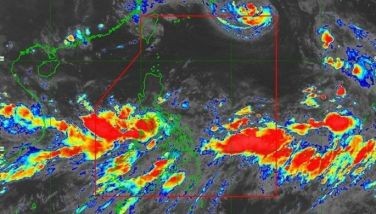The ‘red flags’ vs POGOs
Since the declared banning of Philippine offshore gaming operator (POGO) firms in the country to be effective by the end of this year, residents of Multinational Village in Parañaque City were among those who rejoiced at this official announcement by the government. The official policy to ban POGOs was declared by no less than President Ferdinand “Bongbong” Marcos Jr. (PBBM). In fact, it was roundly applauded during his third State of the Nation Address (SONA) at the joint opening session of the 19th Congress in late July.
Julio Templonuevo, president of the Multinational Village Homeowner’s Association Inc. (MVHAI), lauded PBBM’s order to ban POGO operations as having “partially solved” the problems of their gated village, particularly peace and order. Composed of about 2,500 households from high-and middle- income families, Templonuevo told us at the Kapihan sa Manila Bay news forum last Wednesday that as many as 90 POGOs have been operating inside their village since 2018 under the previous leadership of the MVHAI.
This was the principal issue the MVHAI has brought against its past president when they elected last year their new set of 11-man Board of Directors now headed by Templonuevo. According to Templonuevo, these POGOs entered into lease contracts with residential homeowners. Some POGOs were even allowed to rent outside the designated commercial areas of the village in violation of their MVHAI zoning rules and regulations.
The POGOs, he noted, preferred residences that have two and three floors. These were turned into either POGO hubs or dormitories for the POGO workers, mostly foreign nationals from China and Vietnam, he learned later. Based on MVHAI records, he cited, POGO operators paid as much as P500,000 per month as rental and many paid in cash, some even with advanced payments.
After their investigations, he disclosed, these POGOs were not licensed by the Philippine Amusement and Gaming Corp. (PAGCOR). Apparently, he surmised, these POGO owners considered locating at Multinational Village because of its “strategic” location as being closest to the Ninoy Aquino International Airport (NAIA) for entry and exit of their Chinese-speaking nationals.
From then on, the residents suffered and were disturbed by the “unusual” flurry of activities of crowding of people, mostly Chinese and Filipino youngsters, smoking and drinking late at night in front of fully-lighted houses and the frequency of vans driving in and out of the four gates of their village. In fact, he quipped, their village security guards can distinguish the vans being used to fetch POGO workers, with the high-end Alphard being used by the “bosses” of the POGOs.
Templonuevo disclosed the new Board of Directors now requires these POGO vans to secure MVHAI “stickers” even if these vehicles were merely passing through to ferry passengers.
Worse, so much trash was left behind that littered their village roads, Templonuevo rued. He also mentioned the frequent breakdown of power transformers inside their village, apparently because of overloaded electricity consumption of these POGOs. And even erratic internet connection allegedly caused by the “heavy” internet usage of POGOs for their online activities, he added.
“The village paid a high price for the presence of these POGOs,” the MVHI president deplored.
These are the “red flags,” according to Templonuevo, that drove residents to remove their past MVHAI president. They accused him of allegedly having abetted these POGOs that proliferated in “guerilla” operations inside their residential village.
After the SONA, Templonuevo noted, these houses and residences allegedly used for POGO were suddenly deserted and unusually quiet. “Mga dalawang buwan walang laman ang mga bahay, nagtakbuhan,” Templonueve recalled.
In behalf of the MVHAI, Templonuevo appealed to both the national and the local government authorities of Parañaque City against the attempts of the former president of their association behind the POGOs. Armed with an order from the Department of Human Settlements and Urban Development (DHSUD), the former MVHAI president allegedly wanted to wrest back the leadership of their village.
From a peak of 90 houses, the MVHAI counts only up to 40 registered under “corporate” entities as owners of these houses and lots in their village still suspected to be involved in POGO activities. At the height of their POGO operations, he estimated as many as 12,000 foreigners were registered as residents of Multinational Village and the “satellite villages” that surround their village.
When he took over the MVHAI leadership, Templonuevo implemented the order of Barangay Moonwalk, which covers the high-end community, to issue identification cards starting last year. Through this required ID, it helped the MVHAI to identify who and where the POGOs are, he admitted.
After the perceived slowdown of POGO activities inside Multinational Village, he recently discovered that many of those left behind in these POGO firms are Filipino IT (information technology) workers. Two of them the other day reached out to him after their POGO was raided by police authorities. Under MVHAI house rules, he explained, residents must secure “move out clearance” before the village security guards can allow them to exit the gates with their belongings.
So Templonuevo took the opportunity to interview the two who live in the POGO dormitory in their village. According to the two Filipino POGO workers, they are paid not less than P20,000 a month in fixed salary, free meals and free stay-in dormitory. If they want to earn higher income, the two claimed, they were given “quota” from “online scamming” activities to earn two percent commission from the total amount of money scammed.
“Aside from POGOs, they become scamming hubs right inside our village. So their illegal operations also pose national security problems,” he warned.
Following the President’s announcement of the soon-to-be banned POGOs, Templonuevo disclosed he is now being visited by national government authorities from PAGCOR and intelligence agencies acting on “tips” about the remaining presence of POGO firms inside the village. He believes those who have left their village merely transferred to other nearby communities.
Even before the ban takes effect on Dec.31 this year, these illegal POGOs have ingeniously evolved into “guerrilla” operations. But the “red flags” are up.
- Latest
























